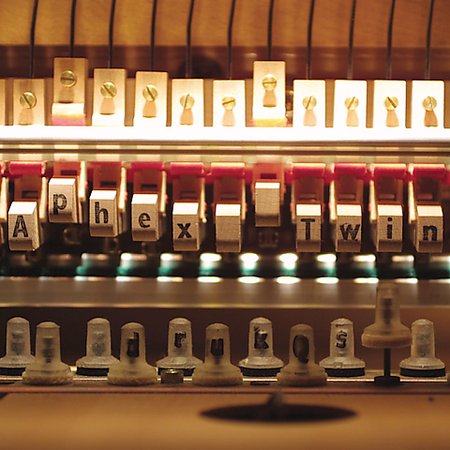
90.
Aphex Twin
drukqs
[Warp; 2001]
Drukqs came out in 2001, two years after the phenomenal “Windowlicker” single, and Richard D. James (known professionally as Aphex Twin) had a lot to live up to, just based on “Windowlicker” alone. OK, Aphex Twin devotees were also still reeling from the Richard D. James album, his prior full-length, which redefined electronic music for many people. On paper, drukqs seemed like it could have been James’ tour de force and eclipsed everything in his back catalog – 30 tracks spread across two CDs and five vinyl LPs, complete with strange, nonsensical song titles reminiscent of Autecthre. It seemed too good to be true. No doubt, drukqs is an excellent album, but to many fans, it seemed like a collection of James’ best ideas over the years – piano compositions, ambient music, neck-snappingly fast breaks and beats. It’s all there on drukqs, and surprisingly, even though James’ most well-known and influential styles coexist on the album, it doesn’t ever feel like a “Best Of” or a compilation album. It paces itself very well, despite zig-zagging through piano pieces to jungle and drum ‘n’ bass. Somehow, I think James knows what he’s doing, and after a long absence last decade, we’re looking forward to his inevitable comeback.
– Arika Dean
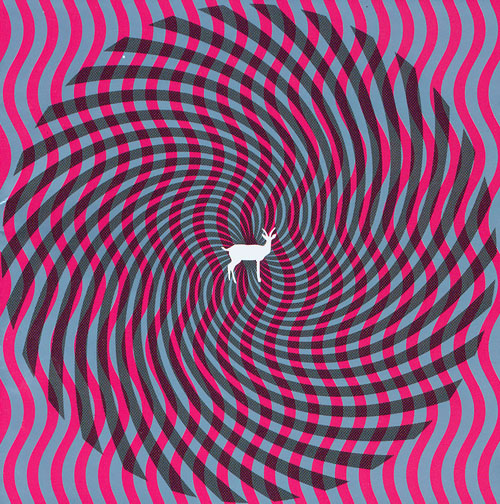
89.
Deerhunter
Cryptograms
[Kranky; 2007]
Concurrent critical opinion will tell you that follow-up Microcastle is the superior album, trading in Cryptograms’ sprawl for tightly-wound finesse, but they’d be wrong. Cryptograms is the Atlanta psych-rock band’s masterpiece and one that they likely won’t be able to equal again – it has that feeling of accidentally stumbling on something great, a sound that can’t be repeated because of the corrupting experience that comes after. The album’s two halves were recorded months apart, but even with the obvious stylistic shift in the middle of the album, it’s remarkably cohesive. Generally, there are two types of songs here: beautifully composed ambient pieces and surprisingly catchy pop songs that usually end up being swallowed by effects pedals. Somehow it’s never pretentious; the ambient parts sound improvised and unrehearsed, and the pop songs burn with the energy of a live band – but at the same time it’s endlessly layered, complex and detailed. There’s even an eight-minute pseudo-Krautrock odyssey that nicely divides the album into its two halves. Cryptograms treads a captivating trail as the band finds and establishes its own unique sound over the course of the very record. By the time their next one was ready, they had finally found and settled into it, losing that thrilling feeling of discovery along the way, but at least we have a document of their journey.
– Andrew Ryce
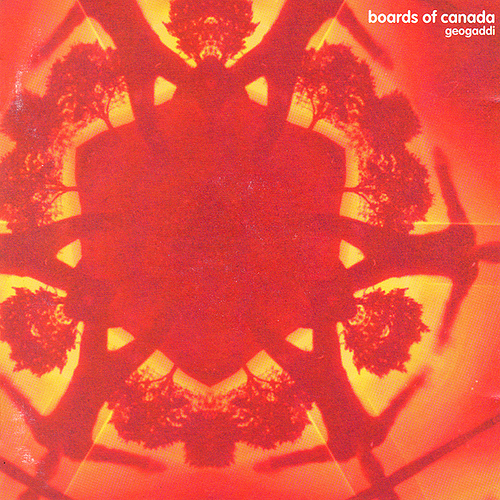
88.
Boards of Canada
Geogaddi
[Warp; 2002]
I more often than not have trouble expressing why I like electronic music; I’m by no means an expert concerning such, and my reasons for liking an electronica record don’t always extend further than “it makes cool sounds.” But something about Geogaddi just flat-out makes me feel uncomfortable; somewhere in this labyrinth of a record lurks something evil, I’m sure of it. I don’t know if it’s the eerie samples, the warbling beats, whatever, but when you hear the voice say “1969 in the sunshine” in, yes, “1969,” it sounds far less innocuous than a line like that ought to. I can’t put my finger on what it is exactly, and never have been able to. I remember listening to this album through a boom box whilst I was painting my garage a few summers ago. The oppressive and thick heat, mixing with the sounds of Geogaddi. I could feel the skin on my neck burning as “Gyroscope” was clawing its way into my brain. Lots of music that I love has odd little memories attached; that day I spent listening to Geogaddi is one of the most vivid I have.
– Bill Delaney

87.
Interpol
Antics
[Matador; 2004]
Not to say the band doesn’t record great music, or that the results don’t at times sound grand, but everything about Interpol is pretty washed out. Take Antics‘ cover art: it’s just type over a white background. The album simply tries to continue the success of Turn On the Bright Lights. The band would try to challenge themselves a bit more on their third effort, but the results just wouldn’t be as good.
Maybe it’s best if Interpol just doesn’t try too hard. My guess is they had no idea Bright Lights would be such a damned big deal. It’s a great record through and through, but it’s all pretty sparse and unassuming.
While due to post-hyping it of course wasn’t as well received, Antics is just as listenable as their first effort. It may not flow as flawlessly, or come off as an equally cohesive work, but track for track, Antics is still incredible, underrated, in fact. Judged individually, many songs are more immediately likeable. “Next Exit” may represent the band’s intentions best; it begins a fine record with a plodding, warily hopeful ballad: “We’re gonna trek this shit around, and make this place a heart to be a part of again.” Take it as the record’s mission statement.
– Chase McMullen
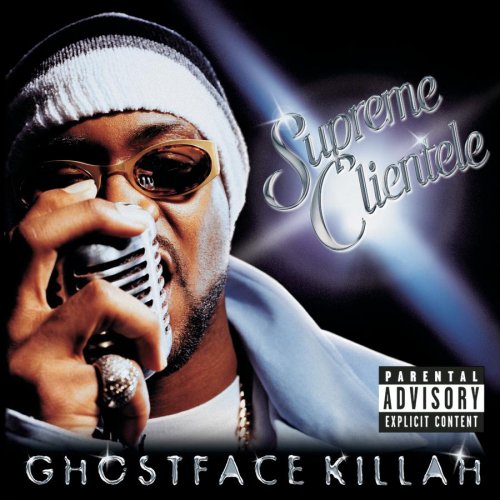
86.
Ghostface Killah
Supreme Clientele
[Razor Sharp/Epic/Sony; 2000]
“Sup, y’all, wassup? This is Ghostface, straight from Statton Island…” “Nutmeg” opens Ghostface Killah’s 2000 opus, Supreme Clientele with a nearly classy, classic vibe. Aside from what Ghostface’s actually rapping about, of course. There’s never been any watering down of the MC’s rapid-fire, intense delivery. Drug deals, murders, and explicit sexual scenarios have always served as Ghostface’s main interests. Clientele finds Ghostface at his best; “Saturday Nite” sounds off, “We interrupt this special bulletin to bring you one of the illest verses of all time…,” the beat changes, and the listener feels as if they’re slowly driving in NY, heading towards some illegal affair.
When discussing the offerings of Wu-Tang members gone solo, GZA’s Liquid Swords and Raekwon’s Only Built 4 Cuban Linx… are the typical picks for the best of. Clientele often received equally strong reviews to these two classics from publications, but never seems to receive the same attention. It may just be because the record is more recent than those offerings, but the oversight is a big one. Aside from perhaps Fishscale, Clientele is easily Ghostface’s best effort. From “Nutmeg” onwards, the record offers classic Wu-affiliated cuts, and is one of the decade’s staple hip-hop records.
– Chase McMullen
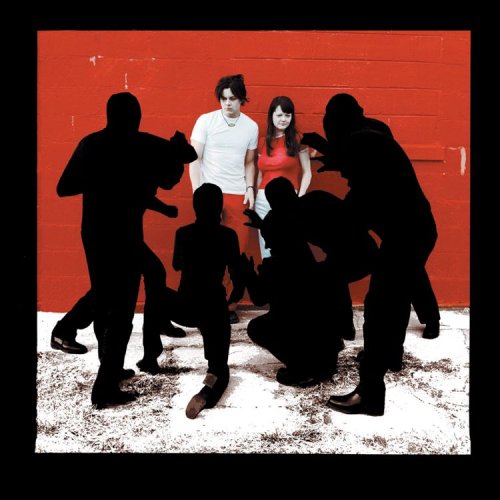
85.
The White Stripes
White Blood Cells
[Sympathy for the Record Industry; 2001]
Jack White might be the greatest living guitar player, and if he isn’t, the difference between whoever it is and him is negligible. Dude can slay.
There’s nothing fancy about White Blood Cells, the Stripes’ Gondry-fueled commercial breakthrough. Jack hasn’t gotten ambitious with the instrumentation yet. Meg doesn’t offer a drum fill for the entire 40 minutes. It just rocks.
Despite its uncompromising simplicity, the strength of White Blood Cells comes from its straddling of the White Stripes’ early rawness and still-to-come accessibility. Jack White’s dirty, virtuosic shredding is on display all over the place to please the band’s early disciples, but there’s enough polish to convert some new ones.
Equal parts country, garage and folk, White Blood Cells is the band’s breakthrough but contains some of the White Stripes’ best work to date. This is as good a record as the band has made since, from sneering opener “Dead Leaves and the Dirty Ground” to the stompy “Hotel Yorba,” and I don’t know of a song as efficiently crammed with candor and immediacy as “Fell In Love With A Girl.”
– Adam Clair
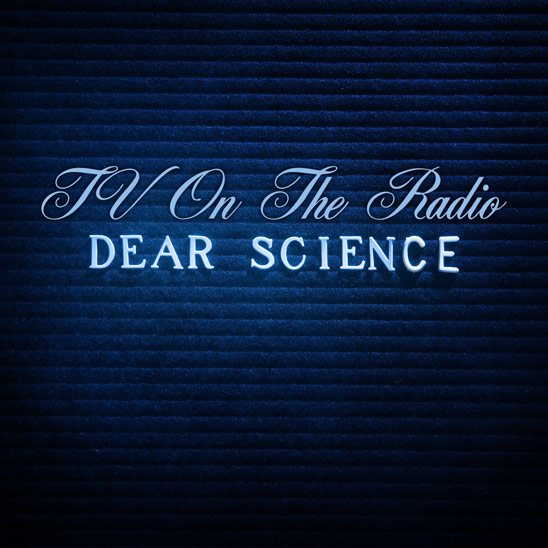
84.
TV on the Radio
Dear Science
[Interscope; 2008]
This Bowie-approved Brooklyn group’s sophomore album, 2006’s Return to Cookie Mountain, drew heavily on his Berlin-era art rock. For their next act, they made their Station to Station. While TVOTR mastermind Dave Sitek’s artier sensibilities are on display here, these songs are all about the groove. Tunde Adebimpe howls about corrupt newspaper reporters and forbidden love over a pretty realistic simulation of what might happen if Trent Reznor and Prince jammed with members of King Crimson. None of the songs on Dear Science quite manage to scale the heights of Cookie Mountain’s “Wolf Like Me,” but “Dancing Choose,” “Family Tree,” and “Golden Age” come close, and the experimental fat of its predecessor is trimmed. Dear Science pulls off a rare trick: it works just as well in the clubs as it does on headphones, sacrificing neither the funk nor the smarts.
– Sean Highkin
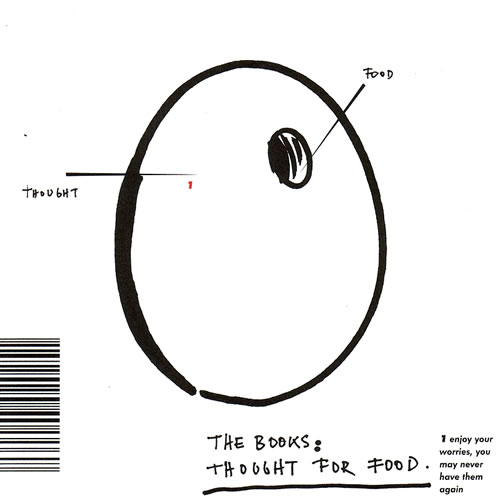
83.
The Books
Thought For Food
[Tomlab; 2002]
“Folktronica” was an ill-thought name given by music journalists to a handful of creators of fine music, great artists such Greg Davis, Four Tet and The Books, among others. However, many of them moved beyond the form. Four Tet’s music closely resembles techno now, while Greg Davis has recently composed incredibly organic dronal works using analog synthesis. The Books have stayed the course though, and it all started with Thought For Food. The album is definitely a unique recording. No one has produced an album like this at the time and no one has since (not even The Books themselves). Influenced by avant-garde artists like Laurie Anderson (whose way of creating works reflecting of the state of America and its people is similar to that of the Books), folk and outsider music, the duo of Nick Zammuto and Paul de Jong carefully blended all this into their debut. It’s purely electrifying, enlightening and incredibly touching and human all at once, and it cannot be nailed down by a dumbass “genre” title made up to create website hits. A perfect combination of the analog and digital, fake and authentic, perfectly capturing the country’s state of mind.
– Rob Galo
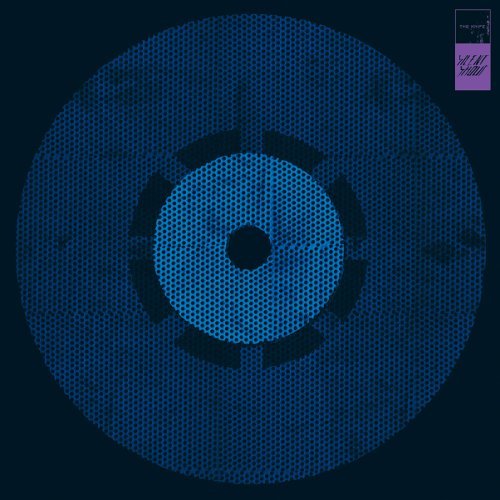
82.
The Knife
Silent Shout
[Rabid; 2006]
The Swedish duo’s third album is a study in contrasts, from the stark two-tone album cover to the simplistic sound palette to the manipulated vocals and the disturbing lyrics. It’s cavernous and dank; water, sweat and blood drip from the walls deep in its furthest recesses. Where the band’s previous albums were serviceable, sometimes genius exercises in colourful and vaguely alien pop, Silent Shout is the sound of Olof & Karin Dreijier selling their souls and coming up with something not only coldly minimalistic but unforgivingly dark. The album isn’t black and white (nor black and blue), but rather a black hole absorbing and sucking the very essence out of everything around it, including the sound it sporadically produces. Despite being somewhat of a techno album, it’s based around silence rather than rhythm or low-end; even the sweeping synth-bass washes of “The Captain” feel like they’re moving in and out from the darkness rather than creating any sort of continuous sound or melody.
Even with its initially simplistic sound, Silent Shout is devastating in its details and remarkable in its breadth. The title track consists mostly of a sequencer and a bass synth, but its melody feels impossible to grasp onto, like trying to hold a slippery bar of soap in your hands. Silent Shout is especially at its best when it is openly, defiantly fucked: the almost-silly Super Mario Bros. shuffle and inhuman vocals of “We Share Our Mother’s Health,” the creepy Cold War allusions of the near-trance “Forest Families,” and the fatalistic lament of closer “Still Life.” Silent Shout is a haunting album, and it feels like something literally not from this world, beamed in from some other universe. It’s fitting that they went on hiatus after this album, as it sounds like it sucked the life out of its creators and condemned them to a tormented existence on display in some sort of demented museum. There’s nowhere to go from here because this album exists in nowhere, trapped inside itself, twitching, screaming, and hell, maybe even dancing a little. I caught a glimpse, now it haunts me.
– Andrew Ryce

81.
Animal Collective
Merriweather Post Pavilion
[Domino; 2009]
Looking back at Animal Collective’s discography is a strange experience at this point; Pablo Honey-to-Kid A-sized strides have been made, and the fact that the blossoming of this band’s sonic explorations has been completely natural is perhaps the essential ingredient to the success of Merriweather Post Pavilion. This album is as sugary sweet and optimistically poppy as they come while remaining in theme endearingly familial and down to earth. Had a producer forced them to make this move 10 years ago it certainly would have been disastrous. At the same time, this album is full of new-found direction; past Animal Collective albums have been great, but it was as though the band accidentally stumbled upon their success. Merriweather sounds as though Animal Collective finally realized how good they actually are, and thought to themselves, “Whoah, what if we actually tried to make a good album?” The result is a treat, an uncharacteristically generous helping of melodic and textural mastery from one of the most cherished names in music today. Every nook and cranny (and there are many) needs to be savored, because although nothing here could be called truly innovative, we’ve certainly never met an album quite like this before. And knowing Animal Collective, we won’t ever meet another like it.
– Ian Barker

